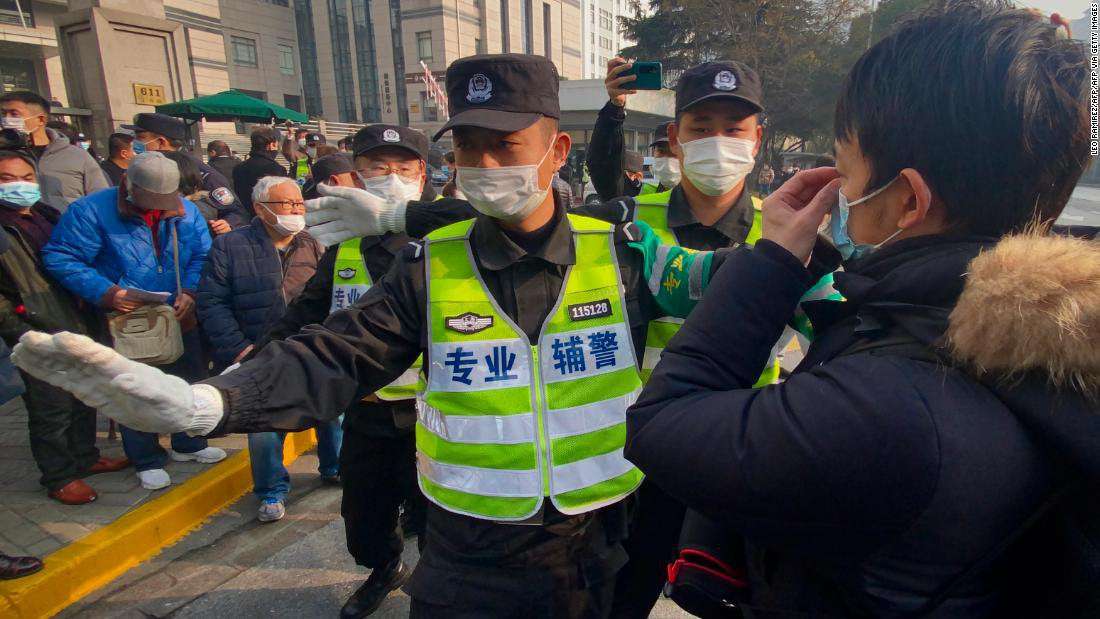Hong Kong (CNN) An independent Chinese journalist who reported from Wuhan at the height of the initial coronavirus outbreak has been jailed for four years by a Shanghai court, her lawyer said Monday.
A former lawyer, Zhang traveled some 400 miles from Shanghai to Wuhan in early February to report on the pandemic and subsequent attempts to contain it, just as the authorities began reining in state-run and private Chinese media.
For more than three months, she documented snippets of life under lockdown in Wuhan and the harsh reality faced by its residents, from overflowing hospitals to empty shops . She posted her observations, photos and videos on Wechat, Twitter and YouTube -- the latter two of which are blocked in China.
Her postings came to an abrupt stop in mid-May, and she was later revealed to have been detained by police and brought back to Shanghai. According to Amnesty International, at one point during her detention Zhang went on hunger strike, during which time she was shackled and force fed, treatment the group said amounted to torture.
Her lawyer Zhang Keke, who visited Zhang earlier this month while she was in detention, described on social media that Zhang had a feeding tube attached to her nose and mouth. He said her hands were tied to prevent her from removing the device, and that she suffered from constant headache and pain in her stomach and throat.
CNN did not immediately receive a response from China's Ministry of Foreign Affairs on allegations of Zhang's mistreatment in detention.
Zhang's lawyer said she attended Monday's hearing in a wheelchair, as she had become frail during her time in detention.
In her indictment , prosecutors accused her of "publishing large amounts of fake information" and receiving interviews from overseas media outlets, including Radio Free Asia and the Epoch Times, to "maliciously stir up the Wuhan Covid-19 epidemic situation."
But Zhang's lawyer said the prosecutors did not display any concrete evidence of the "fake information" Zhang was accused of fabricating during the court proceedings. He added that his client, in a gesture of protest, barely spoke during the trial and refused to plead guilty.
Zhang is the first citizen journalist known to have been sentenced for her role in reporting on the coronavirus pandemic. But it is not her first run in with the authorities.
According to her indictment, she was twice detained for 10 days in 2019 for "picking quarrels and provoking trouble," but the document did not specify what had resulted her detention.
In a statement on Twitter Monday, the British Embassy in Beijing said Zhang's case "raises serious concerns about media freedom in China," adding that a British diplomat tried to attend her trial but was not allowed access.
The embassy said that Zhang "is one of at least 47 journalists currently in detention in China. The whereabouts of other citizen journalists -- including Chen Qiushi and Fang Bin -- is unknown." It urged China to "release all those detained for their reporting."
Zhang is one of a number of independent reporters who have been detained or disappeared in China since the beginning of the pandemic, as the authorities clamped down on coverage of the virus and propaganda outlets went into overdrive portraying Beijing's response as effective and timely.
"Under the guise of fighting the novel coronavirus, authorities in China have escalated suppression online by blocking independent reporting, information sharing, and critical comments on government responses," Chinese Human Rights Defenders, a Hong Kong-based group, said in a report earlier this year
China is the biggest jailer of journalists in the world, according to Reporters Without Borders (RSF) , and tightly controls the press at home while blocking most foreign media outlets via the Great Firewall, its vast online censorship and surveillance apparatus.
In March, China expelled journalists from the New York Times, Washington Post and Wall Street Journal, in an unprecedented move against the foreign press . Beijing said the move -- which came amid a wave of critical reporting about China's initial response to the coronavirus -- was a response for recent restrictions by Washington on how Chinese state media operates in the US.
While sporadic outbreaks have popped up and been swiftly suppressed with lockdowns and quarantines, China has largely controlled the virus, allowing the country to return to relative normality.
Restrictions on the press, however, have not lifted, and Chinese state media has begun aggressively pushing an alternative origin story for the pandemic, with claims the coronavirus may have been circulating outside of the country prior to the initial outbreak in Wuhan.

PandaCheese2016 on December 28th, 2020 at 14:53 UTC »
Her videos are only in Chinese of course. If you speak the language they are worth a look. Most of it seem to be simple observations to me, but I guess the authorities didn't like her occasional commentary questioning their methods, accountability, and being muzzled for simply sharing the truth.
SCMP's coverage is also worth a look, including comments from her supporters who are as brave.
To an extent it didn't matter what she said. It's the fact that the government has total control over what you can say that should be sobering. Chinese have been conditioned to live under this unease understanding for too long, and the desire to break out of it will continue to be manifested in people like her, even at great personal cost.
krillemy on December 28th, 2020 at 11:03 UTC »
Fuck the chinese government
curious_s on December 28th, 2020 at 10:59 UTC »
Accusations include: "receiving interviews from overseas media outlets, including Radio Free Asia and the Epoch Times"
Has anyone actually read the Epoch Times?